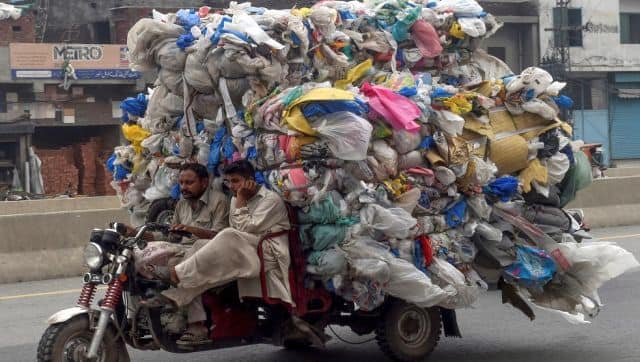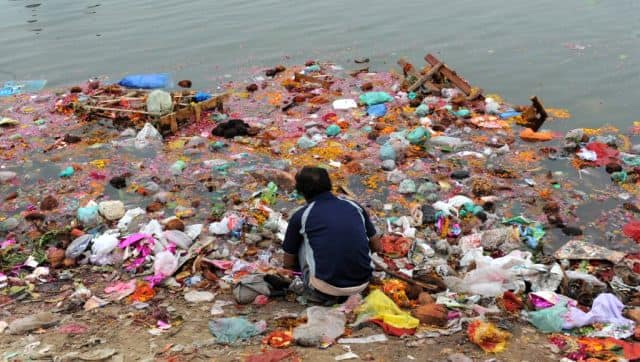India may very soon be bidding adieu to single-use plastic items with the Central Pollution Control Board (CPCB) announcing a ban on such items from 1 July. In an effort to achieve this objective, the pollution watchdog has issued notices to producers, stockists and e-commerce sites so that these items are no longer used or sold. According to the CPCB, items such as ear buds, flags, candy and ice-cream sticks, decorative thermocol, PVC banners less than 100 micron thick, stirrers, wrapping films, cups, glasses, and cutlery, among others won’t be allowed. Additionally, no plastic carry bags less than 120 micron thick can be used from 31 December. As India gears up for this blanket ban , here’s a guide to understanding what single-use plastics are and why they are harmful for the environment. What’s the definition of single use plastic? Single-use plastics, or disposable plastics, are used only once before they are thrown away or recycled. These items are things like plastic bags, straws, coffee stirrers, soda and water bottles and most food packaging. In India, single-use plastic was defined as “a plastic commodity intended to be used once for the same purpose before being disposed of or recycled” in its Plastic Waste Management Amendment Rules, 2021. An expert committee constituted by the Department of Chemicals and Petrochemicals has come out with the ‘Report on Single Use Plastics’. This report has categorised plastic products based on their environmental impact and utility and those found to have the lowest utility and highest environmental impact have been recommended for a phase-out. These include thin carry bags (less than 50 micron); non-woven carry bags and covers (less than 80 gsm and 320 microns); small wrapping/ packing films; straws/ stirrers; cutlery such as foam cups, bowls; earbuds with plastic sticks; cigarette filters; small plastic bottles; plastic banners; among other products. [caption id=“attachment_10402181” align=“alignnone” width=“640”]  As per UNEP figures, the world produces about 300 million tonnes of plastic waste every year: that’s nearly equivalent to the weight of the entire human population. AFP[/caption] Major contributor to pollution Plastics in general has been found to a major culprit in rising pollution levels in the world and in India. According to the United Nations Environment Programme (UNEP) half of all plastic produced is designed to be used only once — and then thrown away. As per UNEP figures, the world produces about 300 million tonnes of plastic waste every year – thats nearly equivalent to the weight of the entire human population. Researchers estimate that more than 8.3 billion tonnes of plastic has been produced since the early 1950s. About 60 per cent of that plastic has ended up in either a landfill or the natural environment. Also see: From mountains to oceans: Plastic pollution exceeds Earth's safe limit Only 9 per cent of all plastic waste ever produced has been recycled. About 12 per cent has been incinerated, while the rest — 79 per cent — has accumulated in landfills, dumps or the natural environment. Additionally, a staggering 8 million tonnes of plastic end up in the world’s oceans every year.
India generates approximately 9.46 million tonnes of plastic waste per year.
This figure is based on the Central Pollution Control Board’s projection that an estimated 25,940 tonnes per day of plastic waste – equivalent to 1,030 truckloads at 25 tonnes per truck – is generated in the country. Of this, 15,384 tonnes of plastic waste or nearly 60 per cent is collected and recycled while the remaining 10,556 tonnes of the plastic waste remains uncollected and littered in the environment, former Union minister Prakash Javadekar had told the Lok Sabha in November 2019. Previous similar bans in India In 2019, the Himachal Pradesh administration imposed a Rs 25,000 as fine for littering or selling single-use plastic cutlery in Himachal Pradesh. The state government banned the use and sale of plastic cutlery, made of non-biodegradable plastic, having one-time use. Himachal Pradesh was the first state in country to ban use of plastic bags in 2009. Since then, the state government has been making efforts to reduce the plastic waste in the towns and rural areas of the state. In 2018, Maharashtra declared a blanket ban on single-use plastic. However, it didn’t stick owing to low awareness, strong lobbying by the industry and a lack of realistic alternatives. [caption id=“attachment_10402211” align=“alignnone” width=“640”]  Around 60 countries have already banned single-use plastic fully or partially. AFP[/caption] Ban isn’t enough While India should be applauded for its brave choice of foregoing single-use plastic, it can’t be the only answer to plastic pollution. Experts state that awareness and more cost-worthy alternatives need to be made available to the masses. Environmentalists agree that the ban is not sufficient on its own and needs to be supported by other initiatives and government regulations.
Also, the amount of plastic that is collected and recycled needs to be improved.
This means that manufacturers should clearly mark the type of plastic is used in a product, so that it can be recycled appropriately. What’s happening in other countries? The European Union came up with a clear vision in the form of the EU plastics strategy which gave the industry a three-year window till 2021 to phase out 10 identified SUP items. Around 60 countries have already banned single-use plastic fully or partially in their countries. For instance, in the US, multiple cities, including San Francisco and Seattle, have banned single-use plastic. To dissuade people from using plastic, cities like Washington DC and Boston have imposed taxes on plastic bags.
Kenya completely banned plastic bags in 2017.
Taiwan has a ban on plastic bags, straws, utensils and cups since 2019. South Korea banned the usage of plastic bags in major supermarkets. Violators are fined around $2,700. With inputs from agencies Read all the Latest News , Trending News , Cricket News , Bollywood News , India News and Entertainment News here. Follow us on Facebook, Twitter and Instagram.


)

)
)
)
)
)
)
)
)



